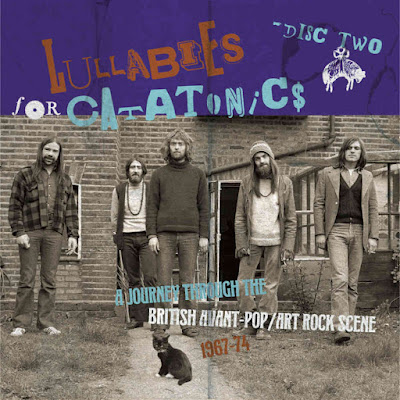“In terms of how we amplified our music, we
were a rock group, but what we heard in our heads wasn’t pop music. We never
looked to other groups for inspiration. Our music didn’t fit into an already existing
format. Pop music didn’t offer enough open space for improvisation … and there
was no way we were going to play a tune the same way twice.” ( Robert Wyatt, Soft Machine” )
Há quem lhe chame simplesmente “progressivo”, ainda que a
designação seja injusta, por redutora, para além de esteticamente incorrecta.
A verdade porém é que o “British Avant-Pop / Art Rock Scene”,
para oportunisticamente utilizar a terminologia dos curadores desta compilação,
foi uma espécie de saco de gatos, onde se arrumava tudo e o seu contrário.
Ron Geesin teria pouco em comum versus Pretty Things, tal
como os Yes versus Mighty Baby, Mick Ronson versus Curved Air, Bachdenkel
versus Giles, Giles & Fripp, Spring versus Fuchsia … etc etc.
E no entanto, viviam-se tempos em que todo o tipo de arrojo
estético, não só era permitido, como encorajado.
“We played Bartok like punks. We murdered
Bartok. If you compare our version of Bartok’s “Romanian Folk Dance” with the
original, it’s the most tasteless thing you’ve heard. It’s note-for-note the
same, but it’s horribly played – not amateurishly played, it’s played with hate
and vilification. The bottleneck stuff is enough to make you throw up like you’re
seasick; and that stands, that’s part of the Dada approach to art, to disgust
and revolt your audience into another state of consciousness. Maybe then they’d
enjoy Bartok.” ( Drachen Theaker,
Rustic Hinge )
“Lullabies for Catatonics, a Journey Through The British Avant-Pop / Art
Rock Scene 1967-74”, compilação de excelência note-se, é um espelho
quase perfeito do frenesi de fazer diferente - ou em alternativa mais pomposo -
que se vivia na época.
E não deixa de ser curioso, ainda que não surpreendente,
serem as opções mais amarradas à herança do psicadelismo, aquelas que melhor e
mais consistentemente resistiram ao teste do tempo. O único que realmente
importa.
“The psychedelic era was really an expanding out
and a realization that you could, at that point in British music, do whatever
you wanted. There didn’t seem to be any boundaries – and if there are, you
completely ignored them.” ( Gary
Brooker, Procol Harum )
Escrito isto, fica o desafio. Mergulhem nos 49 temas aqui
incluídos, 13 dos quais inéditos, e aquilatem dos pontos de intersecção e/ou
das diferenças existentes entre bandas como Soft Machine, Zombies, Blonde on
Blonde, Mighty Baby, Gnidrolog, Riot Squad ( com Bowie ), Cressida, Comus,
Samurai, Renaissance, Nirvana ou Open Road, entre muitas outras.







